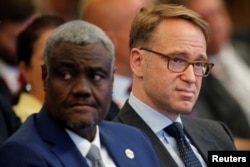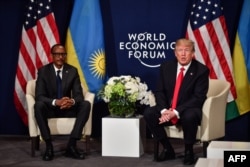Dozens of African leaders will convene in Ethiopia on January 28 for the annual summit of the African Union, with the official theme of combating corruption. But already, one man has taken the spotlight at the gathering — and he isn't even attending.
U.S. President Donald Trump's incendiary comments about African nations — in which he allegedly used a profane term comparing them to toilets — has deeply resonated among the 55-member body, according to the AU's commission chairman, Moussa Faki Mahamat.
"Africa has not yet finished digesting this shocking statement and the hatred and desire to marginalize and exclude Africa that it conveyed," he said. "Such a statement, coming after others by the Trump administration on Jerusalem and the reduction of U.S. funding for international peacekeeping operations, makes one think that multilateralism is in the midst of a grave crisis. The African continent cannot remain silent on this subject."
Trump, for his part, denied making the comment during White House talks on immigration earlier this month.
Rare words
Such harsh words directed at a major ally are rare for the continental body, which makes decisions by consensus and prides itself on multilateralism.
This is the second year that the U.S. leader has become a focus in an event meant for African nations to talk about reforming national institutions, restoring peace and improving the lives of some 1.2 billion people on the world's fastest-growing continent.
Last year, delegates were upset over the Trump administration's announcement that people from certain countries would be banned from visiting the U.S., which initially targeted three AU member states: Libya, Somalia and Sudan. The ban has since been expanded to include the central African nation of Chad.
AU analyst Liesl Luow-Vaudran spoke to VOA from Addis Ababa and said she expects to hear some pointed words against the U.S., but that the remarks are likely to be less vitriolic now that firebrand Zimbabwean leader Robert Mugabe has left office. Luow-Vaudran also said she does not expect the AU to pass any resolutions on the U.S.
And that, she says, is a key weakness of the Addis Ababa-based institution: The AU is built on consensus, and getting 55 members to agree on sensitive issues is a challenge. For example, she says, while it's commendable that the continental body has chosen corruption as its theme this year, members have little power to enforce their resolutions, and are hesitant to make decisions that could be seen as trampling on the sovereignty of other nations.
"The AU, for African citizens, has yet to show its relevance when it comes to, for example, intervening in peace and security issues and crises on the continent, which, to an extent, is the core business of the AU," she said. "It needs to intervene where no one else will and mediate in crises. ... But to a large extent, the AU is struggling, because it is such a big organization in terms of member states, but it's a small organization, in terms of capacity."
When it comes to the U.S., it is clear the body doesn't speak as one: The AU's current head, Rwandan President Paul Kagame, smiled Friday as he met with Trump on the sidelines of the World Economic Forum in Davos, Switzerland, and discussed trade and cooperation. Neither man spoke about Trump's alleged comments on African countries when they met afterward with reporters.
Luow-Vaudran notes, however, that for decades, the only non-African leaders allowed to speak at the opening ceremony — and again on the schedule this year — were Palestinian leader Mahmoud Abbas, and members of the Arab League.
More action?
Elissa Jobson, AU relations adviser for the International Crisis Group, says she'd like to see more action from the AU.
"What I'd like to see on the agenda would be some of the crucial peace and security issues: The [Democratic Republic of] Congo, South Sudan and Somalia, although I expect these will not be on the agenda," she told VOA. "I think we'll probably also see them tackling another crucial issue for the African Union, the institutional reforms that have been spearheaded by Paul Kagame."
But that, she says, is the nature of meetings like this.
"I think it's similar with a number of summits like this: the main sessions, the formal sessions, countries come with prepared speeches, they're not open to debate, it's a place to get your position across without really, sort of, getting into the details of the subjects that are on the agenda," she said. "So often, the real debate takes place on the sidelines, inside meetings, in bilateral meetings."






